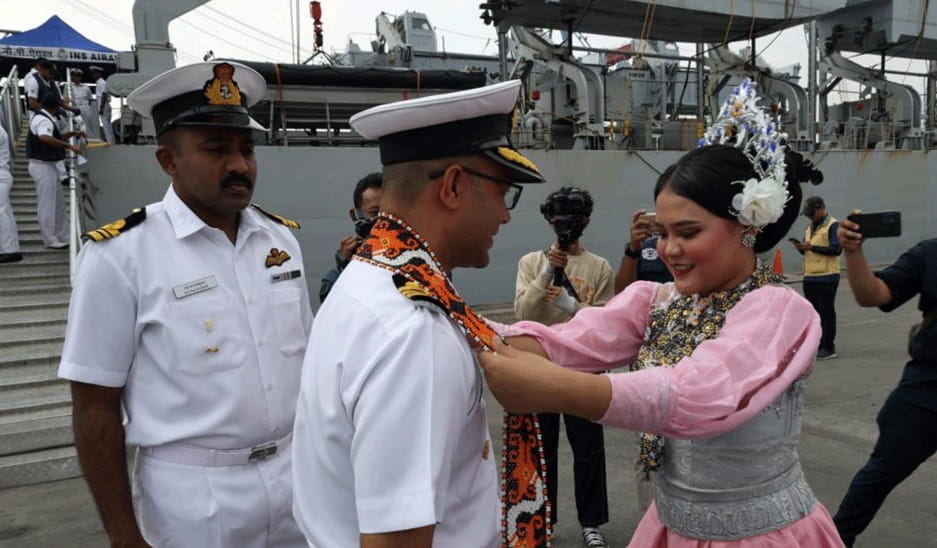
INS Airavat receives a traditional Indonesian welcome in Jakarta, August 2023. | Sea Waves Magazine

The Indonesia-India relationship is at a crossroads, with both challenges and opportunities ahead. By leveraging their complementary strengths and addressing common challenges, both countries can enhance their bilateral cooperation. The comprehensive strategic partnership between Indonesia and India holds great potential for contributing to regional stability and prosperity in the Indo-Pacific region. At the same time, both countries can no longer maintain the status quo. Both Indonesia and India need to understand that many of their interests converge and thus need to continue taking initiatives to strengthen their relationship.
Introduction
Indonesia and India have shared a long history of cultural, economic, and political interactions. The ties can be traced back to ancient times, with the influence of Indian culture visible in Indonesian art and historical relics such as the massive temple complexes of Borobudur and Prambanan in Central Java. In modern times, India was one of the first countries to support Indonesian independence. Later, it cooperated and supported Indonesia during the Asian-African Conference in Bandung in 1955, which was pivotal in establishing the non-alignment movement led by both President Sukarno and Prime Minister Nehru.
Since then, both Indonesia and India have maintained good relationships in various sectors, including defense and security cooperation. In 2001, India and Indonesia signed a defense cooperation agreement establishing the Joint Defense Cooperation Committee (JDCC). In 2018, India and Indonesia upgraded their strategic partnership to a "Comprehensive Strategic Partnership." In the last few years, both the Indian and Indonesian navies have taken part in a bilateral maritime exercise known as "Samudra Shakti." The Indonesian and Indian Armies also hold a joint exercise called "Garuda Shakti."
Current challenges
Despite growing ties between Indonesia and India, many challenges remain, notably the lack of depth in the relationship, which leads to a lack of attention from Indonesia towards India and also from India to Indonesia, resulting in a lack of trust. It is unfortunate that despite its size and growing importance in global affairs, and its geostrategic location literally next door to Indonesia, India has received scant attention from the Indonesian elite.
This view is reflected in ISEAS' State of Southeast Asia Surveys, which have been trying to gauge the viewpoints of countries in Southeast Asia by interviewing their political, business, military, and foreign policy elites for the past six years. Among Indonesians questioned in this survey, almost all consistently think that India has almost no political and strategic influence in Southeast Asia, in contrast to China and the United States.
Table 1: In your view, which country/regional organization has the most political and strategic influence in Southeast Asia?
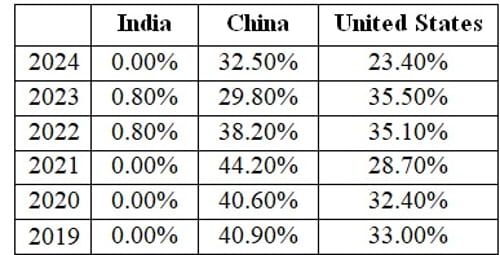
Source: ISEAS' State of Southeast Asia Survey | (https://www.iseas.edu.sg/category/centres/asean-studies-centre/state-of-southeast-asia-survey/)
More than half of those surveyed have little or no confidence that India "will do the right thing" to contribute to global peace, security, prosperity, and governance. Of those who have little or no confidence in India's ability, more than 40% think that India simply does not have the capacity or political will for global leadership. For the results in 2024, more than a quarter do not believe India is a responsible or reliable power, as noted in the following two tables.
Table 2: How confident are you that India will “do the right thing” to contribute to global peace, security, prosperity, and governance?

Source: ISEAS' State of Southeast Asia Survey | (https://www.iseas.edu.sg/category/centres/asean-studies-centre/state-of-southeast-asia-survey/)
Table 3: Among those who have no or little confidence, why do you distrust India?
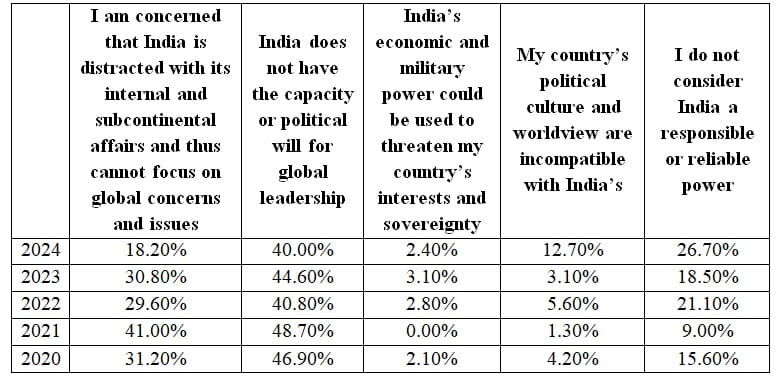
Source: ISEAS' State of Southeast Asia Survey | (https://www.iseas.edu.sg/category/centres/asean-studies-centre/state-of-southeast-asia-survey/)
Similarly, in Lowy Institute's Indonesia Poll 2021, which conducted a nation-wide survey to gauge regular Indonesian feelings toward other countries, the “feeling thermometer” on a scale of 0 (coldest) to 100 (warmest feelings) put India at 53, similar to China's number but behind the United States' number at 60. Only 38% of Indonesians express confidence in Indian Prime Minister Narendra Modi, behind US President Joe Biden at 44%, but higher than the confidence in China's President Xi Jinping at 34%. Only 41% of Indonesians trust India to act responsibly as a global power, a 17-point fall since 2006. In comparison, slightly more Indonesians at 42% trust China, and 56% trust the United States.
Essentially, at this point, India is not seen as a serious partner that will help maintain regional and global security. As noted in Table 1 above, India is not seen as a player in the region, with both the United States and China dominating attention.
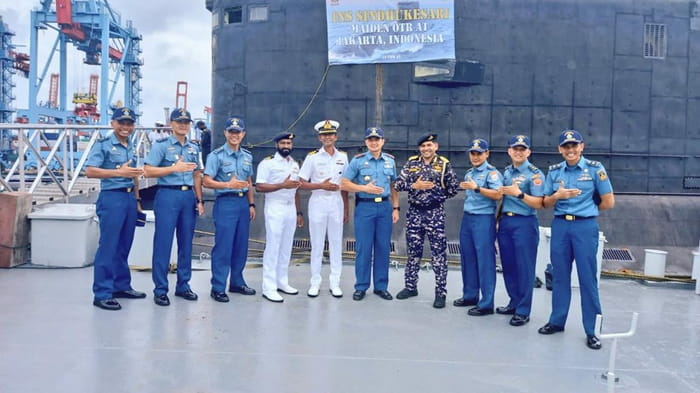
INS Sindhukesari became the first Indian submarine to dock in Jakarta, Indonesia, in February 2023. | Twitter/@indiannavy
Opportunities:Indonesia-India convergence and strategic initiatives
Regardless of how Indonesians currently see India, there are still many opportunities for strengthening the India-Indonesia relationship. In fact, the same ISEAS State of Southeast Asia Survey also shows that Indonesians, in general, are worried about the growing regional political and strategic influence of both China and the United States. There is a growing trend in Indonesia to look for India as a trusted third party to hedge against the uncertainties of the US-China strategic rivalry, although admittedly, the number is still far below Japan and the European Union.
Still, the fact that India's numbers are increasing while the numbers for the European Union and Japan are stagnant means that India has room to grow, especially if India plays its cards right.
Table 4: If ASEAN were to seek out “third parties” to hedge against the uncertainties of the US-China strategic rivalry, who is your preferred and trusted strategic partner for ASEAN?
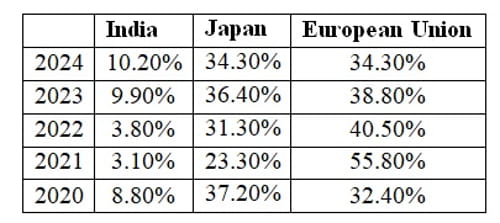
Source: ISEAS' State of Southeast Asia Survey | (https://www.iseas.edu.sg/category/centres/asean-studies-centre/state-of-southeast-asia-survey/)
Table 5: What is your view of China and the United States political and strategic power’s influence on your country?
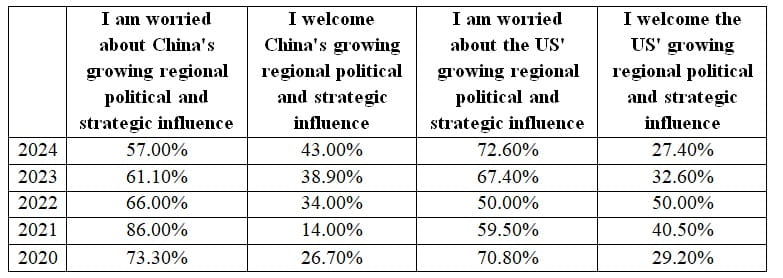
Source: ISEAS' State of Southeast Asia Survey | (https://www.iseas.edu.sg/category/centres/asean-studies-centre/state-of-southeast-asia-survey/)
More importantly, there are many areas for cooperation between both countries. India and Indonesia affirmed a "Shared Vision of India-Indonesia Maritime Cooperation in the Indo-Pacific" in 2018, which promotes trade and investment cooperation, sustainable development of maritime resources, enhanced disaster risk management, increased tourism, and cultural exchanges, improved maritime security and safety, and greater collaboration in academia, science, and technology.
Economic ties between the two countries have been growing steadily, with increasing trade between the two G-20 members that possess rapidly expanding economies. Additionally, India's Act East Policy aligns with Indonesia's economic development programs, notably in Indonesia's focus on land and sea infrastructure building. This alignment opens more areas of collaboration, particularly in port development and maritime logistics.
Furthermore, as key members of the Association of Southeast Asian Nations (ASEAN) related mechanisms, the East Asia Summit (EAS), and the Indian Ocean Rim Association (IORA), Indonesia and India work together to promote regional integration, economic cooperation, and stability in the Indo-Pacific, especially in the Indian Ocean and Southeast Asia. This cooperation enhances maritime collaboration, advancing regional governance and economic prosperity.
In addition, the interests of both countries converge on the issue of maritime security, as both share strategic locations along critical sea routes: the Indian Ocean and the Malacca Strait. Both countries understand that there are many challenges to be tackled, such as piracy, illegal fishing, maritime terrorism, and the growing Chinese influence in the Indian Ocean through its client states, notably Pakistan, Myanmar, and the Maldives.
While Indonesia may not want to directly challenge China and will not entertain the possibility of a defense alliance, India can further expand its economic and military engagement with Indonesia to build a closer relationship.
Conclusion
The India-Indonesia relationship is at a crossroads, with both challenges and opportunities ahead. By leveraging their complementary strengths and addressing common challenges, both countries can enhance their bilateral cooperation. The comprehensive strategic partnership between India and Indonesia holds great potential for contributing to regional stability and prosperity in the Indo-Pacific region. At the same time, both countries can no longer maintain the status quo. Both Indonesia and India need to understand that many of their interests converge and thus need to continue taking initiatives to strengthen their relationship.
(Exclusive to NatStrat)